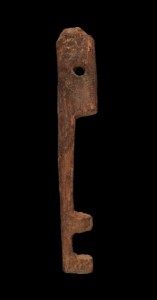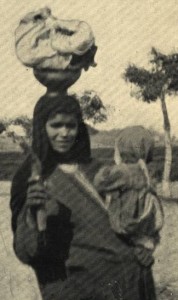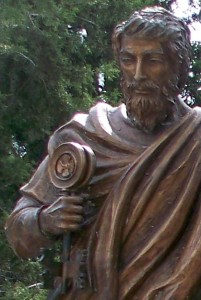A couple days ago I learned something new which shed light on at least two Bible passages for me.
What did I learn? That keys in Ancient Egypt were made out of wood and were very large–we’re talking two feet long or so. They were so big and heavy that they often had to be carried on the shoulder. Egyptian locks had pins just like modern locks, but the pins were a lot larger and made of wood. The key hole itself would have been very large–large enough to put a hand through. (See Paul Haupt, The Book of Canticles, 37).
So, where does this shed light on the Bible? First, Song of Songs 5:4 says “My lover put his hand through the opening; my heart trembled within me, and I grew faint when he spoke” (NAB). Now, this makes no sense if the keyhole is the size of modern ones, even skeleton key size. The keyhole has to be rather big to fit a hand through it. The poetic image makes no sense if the key hole is not big enough for fingers or a hand. Now did Israelites use Egyptian locks? Maybe not, but the technology was close at hand for over a thousand years in a bordering country so they could have easily used such locks.
The second place where this Egyptian key makes a difference is Isaiah 22. Here’s how the passage reads:
20 In that day I will call my servant Eliakim the son of Hilkiah,
21 and I will clothe him with your robe, and will bind your sash on him, and will commit your authority to his hand. And he shall be a father to the inhabitants of Jerusalem and to the house of Judah.
22 And I will place on his shoulder the key of the house of David. He shall open, and none shall shut; and he shall shut, and none shall open.
Now, many Catholic commentators have associated this description of Eliakim as at the al-bayit (over the house) with Peter in the New Testament. Eliakim is assigned to be over David’s house, not to be king himself, but to be more a prime minister. Peter’s assignment by Jesus is very similar. And if Jesus is the legitimate heir to David’s throne, as he claims to be, then this comparison of Eliakim to Peter makes all the more sense. In Matthew 16:19, Jesus tells Peter two things that reference this passage in Isaiah 22. Matthew 16:19 – “I will give you the keys of the kingdom of heaven, and whatever you bind on earth shall be bound in heaven, and whatever you loose on earth shall be loosed1 in heaven” (ESV). First, Peter will be given the “keys of the kingdom.” This sounds a lot like Eliakim getting the key to the House of David. Second, whatever Peter binds on earth will be bound in heaven and whatever he looses on earth will be loosed in heaven. This binding/loosing power sounds a lot like Eliakim’s power to open and shut, a power which cannot be overridden. That’s where the Pope comes in. Since he’s the successor of Peter, he gets the power of the keys. And it turns out these are big old keys! Makes me feel a bit more comfortable with the huge keys Peter normally carries in icons and statues.
Ok, so what about the Egyptian keys? Well, in Isaiah we hear that the key will be upon Eliakim’s shoulder. Why would anyone put a key on their shoulder? I mean, it would fall off, right? It’s too small, right? Turns out though, that ancient Egyptians, who had such huge wooden keys would carry them on their shoulders. Can you imagine if your house key, barn key, office key and car key were all 20 inches long?! It’s not exactly like you could slip those into your pocket on a little metal ring. You’d have to carry them on your shoulder!
I even found a drawing of a Cairo merchant carrying some of these keys on his shoulder. Check it out!
(Image from T. K. Cheyne, The Book of the Prophet Isaiah, 160)




Can’t imagine those locks would have been too hard to pick. . .
Very cool. It makes sense that the Jews would know about Egyptian keys; they lived there for a while (Joseph) and probably imported the technology when they left.
I have a set of brass jailer’s keys which are about 6 inches long and heavy – nothing along the lines of the Egyptian keys, but I use them to teach music and the concept of unlocking the door to find DO.
I will remember this and use this in class. Thanks .
this is super interesting – thanks!